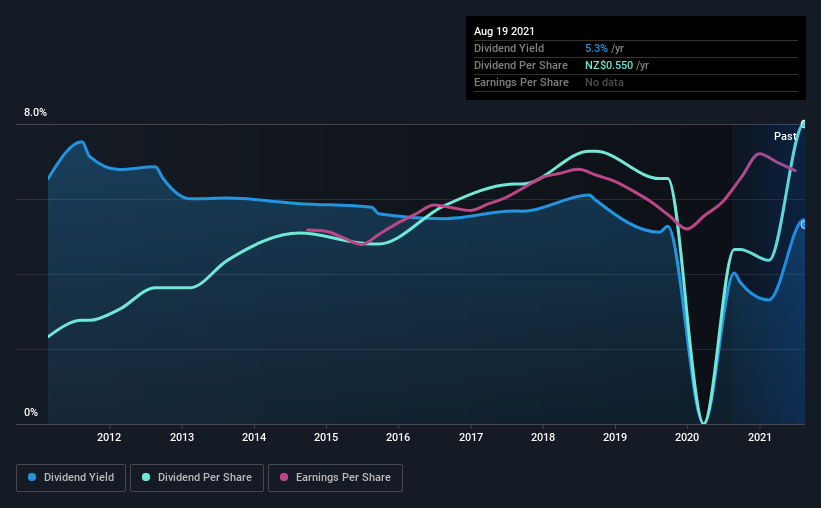Colonial Motor (NZSE:CMO) Will Pay A Larger Dividend Than Last Year At NZ$0.47
The board of The Colonial Motor Company Limited (NZSE:CMO) has announced that it will be increasing its dividend by 25% on the 4th of October to NZ$0.47. This will take the annual payment from 5.3% to 6.3% of the stock price, which is above what most companies in the industry pay.
View our latest analysis for Colonial Motor
Colonial Motor's Payment Has Solid Earnings Coverage
While it is great to have a strong dividend yield, we should also consider whether the payment is sustainable. The last payment made up 72% of earnings, but cash flows were much higher. In general, cash flows are more important than earnings, so we are comfortable that the dividend will be sustainable going forward, especially with so much cash left over for reinvestment.
Over the next year, EPS could expand by 3.0% if the company continues along the path it has been on recently. If recent patterns in the dividend continue, the payout ratio in 12 months could be 85% which is a bit high but can definitely be sustainable.
Dividend Volatility
The company has a long dividend track record, but it doesn't look great with cuts in the past. The first annual payment during the last 10 years was NZ$0.16 in 2011, and the most recent fiscal year payment was NZ$0.55. This implies that the company grew its distributions at a yearly rate of about 13% over that duration. Despite the rapid growth in the dividend over the past number of years, we have seen the payments go down the past as well, so that makes us cautious.
The Dividend's Growth Prospects Are Limited
With a relatively unstable dividend, it's even more important to evaluate if earnings per share is growing, which could point to a growing dividend in the future. However, Colonial Motor has only grown its earnings per share at 3.0% per annum over the past five years. Slow growth and a high payout ratio could mean that Colonial Motor has maxed out the amount that it has been able to pay to shareholders. This isn't the end of the world, but for investors looking for strong dividend growth they may want to look elsewhere.
In Summary
Overall, this is a reasonable dividend, and it being raised is an added bonus. While the payout ratios are a good sign, we are less enthusiastic about the company's dividend record. Taking all of this into consideration, the dividend looks viable moving forward, but investors should be mindful that the company has pushed the boundaries of sustainability in the past and may do so again.
Investors generally tend to favour companies with a consistent, stable dividend policy as opposed to those operating an irregular one. However, there are other things to consider for investors when analysing stock performance. For example, we've picked out 1 warning sign for Colonial Motor that investors should know about before committing capital to this stock. Looking for more high-yielding dividend ideas? Try our curated list of strong dividend payers.
This article by Simply Wall St is general in nature. We provide commentary based on historical data and analyst forecasts only using an unbiased methodology and our articles are not intended to be financial advice. It does not constitute a recommendation to buy or sell any stock, and does not take account of your objectives, or your financial situation. We aim to bring you long-term focused analysis driven by fundamental data. Note that our analysis may not factor in the latest price-sensitive company announcements or qualitative material. Simply Wall St has no position in any stocks mentioned.
Have feedback on this article? Concerned about the content? Get in touch with us directly. Alternatively, email editorial-team (at) simplywallst.com.

 Yahoo Finance
Yahoo Finance 
